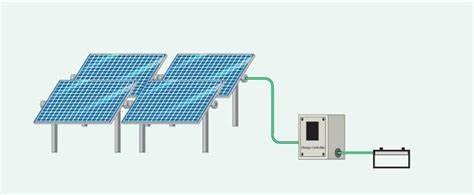A solar system typically includes a solar charge controller (also known as a charge regulator) for several important reasons.
- Battery Protection: In many solar systems, especially off-grid and hybrid systems, energy generated by solar panels is stored in batteries for later use. Without a charge controller, the batteries can become overcharged or overdischarged, leading to reduced battery lifespan or even permanent damage. The charge controller regulates the charging and discharging of the batteries, preventing overcharging and deep discharging.
- Optimized Charging: Charge controllers ensure that solar panels operate at their peak efficiency by regulating the voltage and current supplied to the batteries. They adjust the charging voltage and current based on the battery’s state of charge, temperature, and other factors, ensuring that the battery receives the correct charge to maximize its lifespan and capacity.
- Prevention of Reverse Current Flow: During periods of low or no sunlight, solar panels can draw power from the batteries. A charge controller prevents this reverse current flow from the batteries back to the solar panels, ensuring that energy is not wasted and that the batteries remain charged.
- Load Control: Some charge controllers offer load control features, allowing you to connect and control DC loads (e.g., lights, appliances) directly. The controller can automatically disconnect or reconnect loads based on the battery’s state of charge, preventing over-discharge and damage to the batteries.
- Temperature Compensation: Many charge controllers have temperature sensors to adjust the charging voltage according to the temperature. This compensates for the temperature-dependent characteristics of batteries, ensuring optimal charging in different weather conditions.
- Protection Against Overvoltage: Charge controllers can protect the batteries and connected equipment from voltage spikes or surges that can occur due to factors like lightning strikes or system faults.
- Monitoring and Data Collection: Some advanced charge controllers provide monitoring and data collection capabilities, allowing users to track the performance of their solar system, including energy production, battery status, and historical data. This information can help users optimize their system and troubleshoot issues.
- System Safety: Charge controllers enhance the safety of a solar system by preventing potentially dangerous overcharging or overdischarging of batteries, which could lead to thermal runaway or battery explosions.
- Compliance: In some regions, local electrical codes and regulations may require the use of charge controllers in solar systems to ensure safety and compliance with industry standards.
In summary, a solar charge controller plays a critical role in managing and protecting the components of a solar system, particularly when batteries are involved. It helps optimize energy production, extend the life of batteries, and prevent damage to the system, ultimately ensuring the reliability and efficiency of the solar installation.


